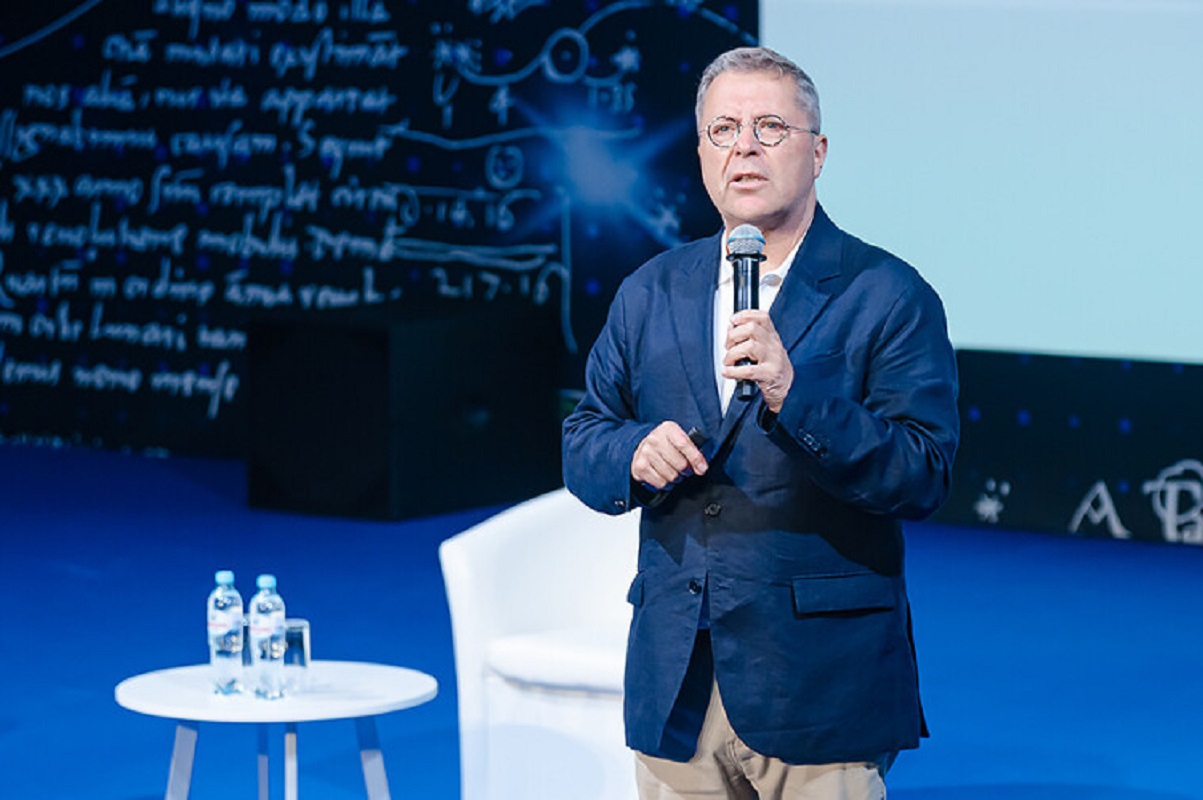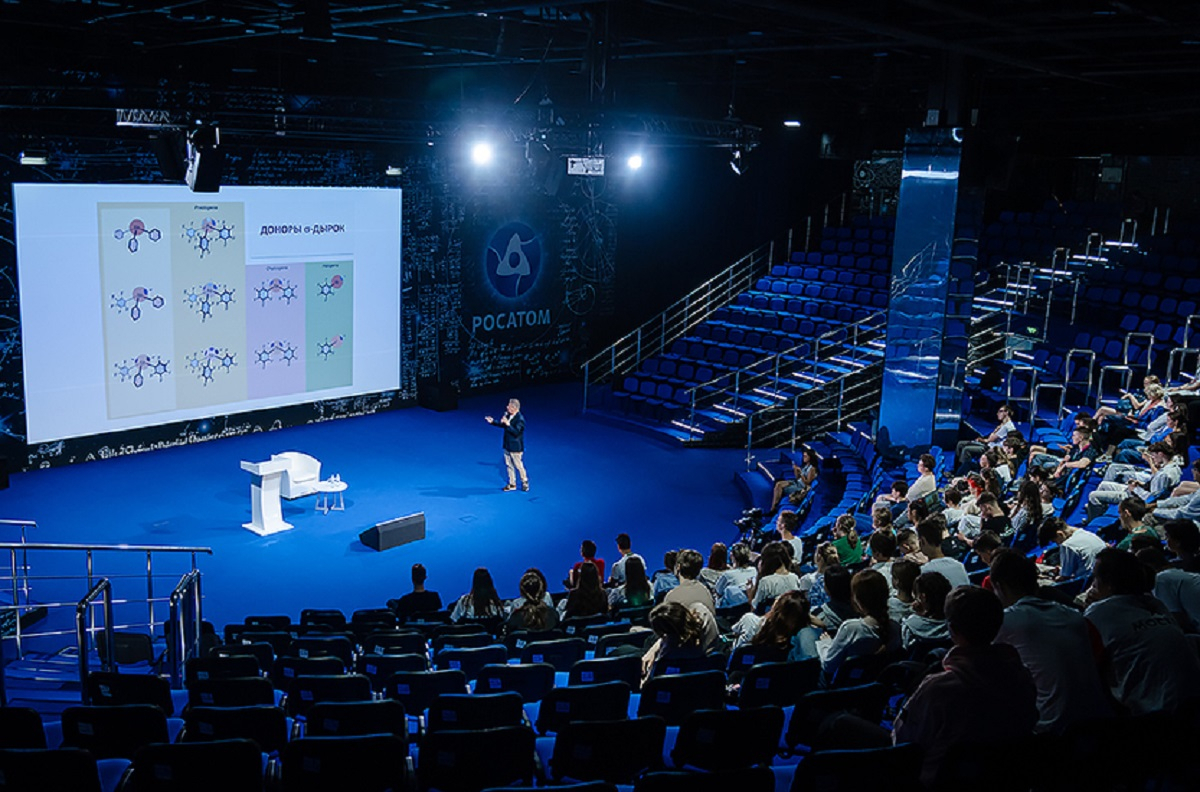Sirius.Magazine: Professor of the Year Vadim Kukushkin: I am wary of Olympiad winners
Vadim Kukushkin is an outstanding scientist, author of about 500 scientific publications, including in the highly rated international journals. He is one of the most cited Russian chemists. What is more is that the Academician of the Russian Academy of Sciences rarely gives interviews. We met him during the Big Challenges. We talked about the migration of scientists, recalled how it was under Peter the Great, discussed modern theatre, winners of Olympiads who were not adapted to routine work, and even debunked one myth.

Vadim Kukushkin is the author of approximately 500 scientific publications, nine monographs, and many Russian and European patents. He is Honorary Professor of St Petersburg University, a full member of the European Academy of Sciences, a foreign member of the Portuguese National Academy of Sciences, Honorary Doctorate at the University of Lisbon (Universidade de Lisboa), and Distinguished Visiting Professor at National Taiwan University of Science and Technology. He has won many Russian and foreign awards, grants and scholarships. Last year, the Russian Professorial Assembly chose him as "Professor of the Year".
Mr Kukushkin, you have collaborated and continue to work with scientists from different countries. How has the change in the political situation affected you? Have your relationships with colleagues changed?
It all depends on the country. I mostly cooperated with Finland. It even turned out that I was a champion in the number of joint Russian-Finnish scientific publications. Yet, after the well-known events, the Finns were simply prohibited by law from collaborating with scientists from our country. They can’t even write me a letter from a corporate email. This is punishable by their university rules. They say the same happens in Germany, but I have never had any significant cooperation projects with the Germans. Now, it is impossible to work with the Finns due to technical reasons.
If a scientist from Finland publishes an article with me, they will simply be fired from their university. Yet, I still actively work and publish with scientists from Spain and Italy. Their position and the position of their universities are different. Science is outside of politics. Yet I have to admit that it has become more difficult to interact, because now they may simply not give you a visa to go to a conference in a European Union country.
How do you feel about the high mobility of scientists and their frequent moves from country to country?
"Scientific heads" are always in high demand in most countries across the world. Everyone is striving to lure them. The relocation of scientists is the norm and has always been the norm. There is nothing unusual about it. In 1724, by Decree of Peter the Great, the Russian Academy of Sciences and St Petersburg University were opened. They invited people from abroad, because at that time we had neither science nor scientists. Laurentius Blumentrost, who, by the way, was born in Moscow, was appointed President of the Russian Academy of Sciences. He was an educated man, and he and the future "invited academicians" were offered huge amounts of money. Perhaps, this was the main reason why foreign scientists went to the swamps where St Petersburg was built. You can live in such conditions and in the city with a terrible climate only for the sake of positions and money. At least, I don’t see any other good reasons.
At that time, for example, Leonhard Euler came to Russia, who became one of the most famous mathematicians in the world. This was the case with Daniel Bernoulli, the future world-famous physicist. What’s wrong with it? Yes, they came for money, but they did a lot both for science and for Russia. We are proud of them and consider them Russian scientists. What difference does it make what your nationality is? More important, in my opinion, is how you identify yourself: biologically Russian Vladimir Mayakovsky was born in the Kutaisi Governorate, studied at the Kutaisi gymnasium and considered himself a Georgian.
If we talk about scientific achievements, high hopes are placed on Sirius students, outstanding schoolchildren. How do you assess the level of chemistry teaching in modern Russian schools? What is the level of those children who come to the federal territory, to the educational centre?
In my opinion, the level of education in chemistry is very uneven. In many ways it can be personalised and depends on a teacher. If a school has an outstanding teacher, everything is fine. Even in those schools where teachers in other subjects are not so strong. Such teacher can inspire and guide them through the learning process. You need to pray for such teachers. There are not many of them. These teachers are exactly what we, university lecturers, survive on.
St Petersburg University has very strong students. I am convinced that our applicants are the best of the best chemists, at least in the Northwestern Federal District. I am an absolutely happy person that I work at St Petersburg University and have the opportunity to collaborate with smart and motivated students. Some of them are so strong that they have been working in our Department since their first year. Even schoolchildren sometimes work with us. Frankly speaking, I don’t really like it, because chemistry is a rather dangerous profession. Yet sometimes I can’t resist as the guys are so motivated that sometimes we meet them halfway and, after going through all the formal safety procedures, we allow them to work in the laboratory under our supervision.
During my lecture at Sirius, I had a very lively audience. It was a pleasure to give a lecture, listen to their questions and answer them. I am glad that we have such educational centre as Sirius. It’s just a pity that this is a unique institution. I would open more centres like Sirius, probably not large-scale, but something similar. The idea of creating and operating Sirius, it seems to me, is just brilliant!
It will be great if the guys learn something from my speech and become interested in something. Who knows, maybe one of them will become my student. I have many examples at my Department when some of the current employees attended my lecture, and this determined their future. We began to work together.
Giving lectures or making reports for adult specialists in your field, rather than for schoolchildren, is incomparably easier. Children must understand very complex scientific concepts that need to be explained in a simple language. It’s easy to complicate, but it’s difficult to simplify. It always takes time and hard work.
Continuing the topic of education, I would like to mention that Sirius is preparing to launch an IT area of study. This is the first project of this kind in Russia, essentially combining secondary and higher education. School-leavers of the 9th grade can enrol in a special programme and graduate at the age of 20 as a certified specialist with a higher education. What do you think about this format? Is it possible to do the same in other areas, for example, in chemistry?
I’m not sure about chemistry. This area of science requires methodical, gradual work. This science must first be perceived, then it needs to settle in the head. It takes a lot of practice. In this regard, many people fail.

By the way, I’m not a big fan of the winners of the Olympiads. My attitude to them is not bad, but wary. More often than not, people whose heads work perfectly and who win contests when they study at school think that their whole life will continue to go like this, that they are winners, they are great and wonderful. Then, they come to the Department, where they have to endlessly stand in front of the rod, do experiments that often cannot be reproduced, and repeat them a hundred times. It’s a routine. This is more likely not science, but the acquisition of experimental work skills, which requires a lot of time. In order to become a chemist, only the head is not enough. You also need to show a character.
According to my candidate dissertation, I am an organic chemist. I am convinced that to become a highly qualified organic scientist, you need to work in a laboratory for 34 years, learn from the experience of research supervisors, acquire all the skills and develop intuition. No matter how brilliant a person is, if you do not have the simplest experimental skills, for example, how to quickly and accurately cut a filter so that it fits tightly onto a Buchner funnel of non-standard diameter, you will not become a specialist.
Are there any myths in chemistry that you would like to debunk?
Unexpected question! Well, maybe this is an example. In organic chemistry, one of the most famous reactions is the so-called aldol condensation. Almost the whole world (including Russia!) calls it the Wurtz reaction after the French chemist Charles Adolphe Wurtz. To some extent, this is a myth, since at the same time this reaction was discovered by St Petersburg University Professor Alexander Borodin. So the ‘debunking of the myth’ is that this reaction should be called the reaction of Borodin Wurtz. Having learned about the publication of his French colleague, Professor Borodin practically stopped research work in the field of chemistry. Apparently, he took the loss of priority very hard. So, as a result of this story, we lost Borodin as a chemist. However, he remains in our memory as a wonderful composer, who wrote the opera ‘Prince Igor’ after leaving science. Alexander Borodin had plenty of talent!
You are a member of the Theatre Society and Philharmonic Society of St Petersburg. Will you go to the Great Summer Music Festival in Sirius, which starts on 13 July?
Unfortunately, I must be leaving before 13 July as there’s a lot to do at the University. Although it’s a shame that I’m missing such a significant event. On this day a concert is given by Valery Gergiev, who is a brilliant maestro and the Dean of the Faculty of Arts at St Petersburg University. I am proud to be University colleague of him! I often go to his concerts at the Mariinsky Theatre, but I have never been to a performance on the open stage.
I just adore theatrical art, especially opera. As for membership... Frankly speaking, it seems to me that I got into these societies quite by accident in the early 2000s. I was a young professor at the leading University in St Petersburg, interested in art and often attended concerts and performances. In other words, I "was in plain sight". The members of the Theatre and Philharmonic societies were mostly people of advanced age, and most likely they wanted to lower this bar by inviting me. At that time, members of societies were often invited to various theatres when they had free seats. They invited us because they understood that we were grateful spectators who were interested in theatre and music, and had empathy with artists and directors. Now, everything has commercialised. For a good production, tickets are easily sold out online. So theatres no longer need to invite anyone. The title of a member of the society is rather a pleasant memory for me.

